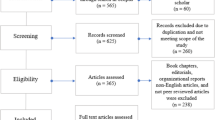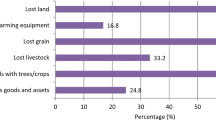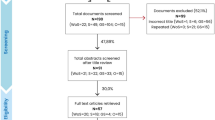Abstract
Aim
We report what role the United Nations Office for the Coordination of Humanitarian Affairs (UN OCHA) cluster approach plays for humanitarian organizations in the context of sudden humanitarian crises. We aim at demonstrating the gap between theory and practice, in particular with respect to differing importance that OCHA has for organizations of different size and organizational structure. Furthermore, we explore the different levels of cooperation between OCHA and humanitarian NGOs and provide suggestions for improvement.
Subject and methods
The devastating earthquake that hit Haiti on 12 January 2010 was followed by one of the largest international humanitarian aid actions ever. Complex humanitarian crises need an organized international humanitarian effort dealing with immediate humanitarian needs and targeting the underlying structural problems in a long-term approach. The UN OCHA aims at improving the coordination of international humanitarian aid. Based on an analysis of the cluster approach and on interviews with NGO stakeholders active in Haiti, we report what role the cluster approach plays for humanitarian organizations in the context of sudden humanitarian crises.
Results
The example of Haiti shows that there are conflicting interests within the humanitarian aid community. The number of non-governmental organizations (NGOs) implementing relief projects in Haiti increased uncontrollably.
Conclusion
The UN OCHA cluster approach provides the structure for improved coordination of humanitarian aid action. At the same time, there is broad agreement that the existing coordination mechanisms reached their limits in the complex crisis in Haiti. An analysis outlines chances for substantial improvement.
Similar content being viewed by others
References
Bennett N (2007) Assessing the impact of humanitarian reform in DRC. Forced Migration Review-FMR 29: 30–32. http://www.fmreview.org/humanitarianreform.htm. Accessed 13 February 2011
BBC (2010) Haiti quake death toll rises to 230,000. British Broadcasting Corporation. http://news.bbc.co.uk/2/hi/8507531.stm. Accessed 26 March 2011
Cosgrave J (2007) Synthesis report: expanded summary. Joint evaluation of the international response to the Indian Ocean Tsunami Coalition, Tsunami Evaluation, London
CIA World Fact Book (2010) Central Intelligence Agency. https://www.cia.gov/index.html. Accessed 13 February 2011
De Mul E (2002) Coordination of humanitarian aid—a UN perspective. Lancet 360(9329):335–336. doi:10.1016/S0140-6736(02)09574-0
Failed State Index (2010) Country profile Haiti. The Fuund for Peace. http://www.fundforpeace.org/web/index.php?option=com_content&task=view&id=409&Itemid=572. Accessed 12 February 2011
Gardemann J (2010) Nachhaltige Nothilfe–Gesundheitsförderung und Krankheitsprävention als Aufgabe der internationalen Hilfe bei Katastrophen und Krisen. In: Impulse–Newsletter zur Gesundheitsförderung 66, Landesvereinigung für Gesundheit und Akademie für Sozialmedizin Niedersachsen, Hannover, pp 13–14
Gardemann J, Razum O (2006) Internationale humanitäre Soforthilfe bei Natur und Gewaltkatastrophen. Public Health Forum 14(51):6–7
Global Lessons Learned Project Steering Committee (2009) The tsunami legacy. Innovation, breakthroughs and change. Tsunami global lessons learned project. International Federation of Red Cross and Red Crescent Societies (IFRC). http://www.ifrc.org/docs/news/09/09050701/index.asp. Accessed 13 February 2011
Heintze HJ, Zwitter A (2011) International law and humanitarian assistance: a crosscut through legal issues pertaining to humanitarism. Springer, Berlin
Henzschel T (2006) Internationale humanitäre Hilfe—Bestimmungsfaktoren eines Politikfeldes unter besonderer Berücksichtigung der Bundesrepublik Deutschland. Books on Demand Gmbh, Norderstedt
Hicks EK, Pappas G (2006) Coordinating disaster relief after the South Asia earthquake. Society 43(5):42–50
Holmes J (2007) Humanitarian action: a western-dominated enterprise in need of change. Forced Migration Review-FMR 29: 4–5. http://www.fmreview.org/humanitarianreform.htm. Accessed 13 February 2011
IASC (2010) Response to the humanitarian crisis in Haiti. Following the 12 January 2010 Earthquake. Achievements, Challenges and Lessons to be learned. IASC Publishing. http://www.humanitarianinfo.org/iasc/pageloader.aspx?page=content-news-newsdetails&newsid=143. Accessed 24 July 2010
Kaiser R, Spiegel PB (2008) Humanitarian emergencies. In: Semba RD, Bloem MW (eds) Nutrition an health in developing countries, 2nd edn. Humana Press, Totowa, pp 677–697
Kessler W, Booth W (2010) Haiti seeks food and shelter so displaced residents can survive the coming weeks. Washigton Post. http://www.washingtonpost.com/wp-dyn/content/article/2010/01/25/AR2010012502224.html?nav=emailpage. Accessed 26 March 2011
Lance B (2006) The legal framework of humanitarian assistance in the UN System. 7th AIDA IHL Forum, 10 May 2006, Al-Ram. www.diakonia.se/…/IHL/IHLfoum/…/Lance_Legal_Framework_of_Humanitarian_Assistance_in_the_UN_System_FINAL.pdf. Accessed 13 February 2011
Lanzer T (2007) Humanitarian reform: a view from CAR. Forced Migration Review – FMR 29:25–27. http://www.fmreview.org/humanitarianreform.htm. Accessed 13 February 2011
Lucatello S (2010) La ayuda humanitaria internacional y el desastre de Haití. Foreign Aff Latinoamérica 10(2):27–34
Messina C (2007) Strengthening the humanitarian coordinator system. Forced Migration Review - FMR 29: 23. http://www.fmreview.org/humanitarianreform.htm. Accessed 13 February 2011
Meuser M, Nagel U (2005) Das Experteninterview – vielfach erprobt, wenig bedacht. Ein Beitrag zur qualitativen Methodendiskussion. In: Bogner A, Littig B, Menz W (eds) Das experteninterview. Theorie, methode, Anwendung. Leske+Budrich, Opladen, pp 71–93
Morris T (2006) UNHCR, IDPs and clusters. Forced Migration Review - FMR 25: 54–55. http://www.fmreview.org/peopletrafficking.htm. Accessed 13 February 2011
Munz, R (2007) Im Zentrum der Katastrophe. Was es wirklich bedeutet vor Ort zu helfen. Campus, Frankfurt am Main
OCHA (2010a) This is OCHA. United Nations Office for the Coordination of Humanitarian Affairs. OCHAonline. http://ochaonline.un.org/OCHAHome/AboutUs/OCHAPublications/tabid/5864/language/en-US/Default.aspx. Accessed 24 July 2010
OCHA (2010b) History of OCHA. OCHAonline. http://ochaonline.un.org/OCHAHome/AboutUs/HistoryofOCHA/tabid/5964/language/en-US/Default.aspx. Accessed 24 July 2010
Razum O, Gardemann J, Will B (2006) Nothilfe versus Entwicklungszusammenarbeit. In: Razum O, Zeeb H, Laaser U (eds) Globalisierung–Gerechtigkeit–Gesundheit. Einführung in International Public Health. Hans Huber, Bern, pp 327–332
Steets J, Grünewald F, Binder A et al (2010) IASC Cluster Approach Evaluation 2, Synthesis Report. Groupe urgence réhabilitation développement, Global public policy institute. www.humanitarianinfo.org/iasc/downloaddoc.aspx?docID=5269&type… . Accessed 13 February 2011
Stobbaerts E, Martin S, Derderian K (2007) Integration and UN humanitarian reforms. Forced Migration Review – FMR 29:18–20. http://www.fmreview.org/humanitarianreform.htm. Accessed 13 February 2011
The Lancet (2010) Growth of aid and decline of humanitarianism. Lancet 375(9711):253. doi:10.1016/S0140-6736(10)60110-9
Tinnemann P (2010) Nothilfe für Haiti. Berlin Medical – Supplement 02.10. Reise und Impfmedizin pp 4–5
United Nations (2010) MINUSTAH United Nations Stabilization Mission in Haiti. http://www.un.org/en/peacekeeping/missions/minustah/mandate.shtml. Accessed 12 February 2011
Ville de Goyet C, Morinière L (2006) The role of needs assessment in the tsunami response. Tsunami Evaluation Coalition, London, p 36
Webster M, Walker P (2009) One for all and all for one. Feinstein International Center Tufts University, Medford. https://wikis.uit.tufts.edu/confluence/dosearchsite.action?key=FIC&searchQuery.queryString=Webster+M%2C+Walker+P+%282009%29+One+For+All+and+All+for+One&searchQuery.spaceKey=FIC. Accessed 13 February 2011
World Vison (2010) Haiti three month on: World Vision aids 1.8 million people. World Vision. http://www.worldvision.org.uk/server.php?show=nav.3548. Accessed 26 March 2011
Acknowledgment
MS received a grant from the German Academic Exchange Service (DAAD) to fund field research in Haiti.
Conflict of interest
The authors declare that there is no conflict of interest.
The article exclusively reflects the authors' personal opinion.
Author information
Authors and Affiliations
Corresponding author
Rights and permissions
About this article
Cite this article
Stumpenhorst, M., Stumpenhorst, R. & Razum, O. The UN OCHA cluster approach: gaps between theory and practice. J Public Health 19, 587–592 (2011). https://doi.org/10.1007/s10389-011-0417-3
Received:
Accepted:
Published:
Issue Date:
DOI: https://doi.org/10.1007/s10389-011-0417-3




